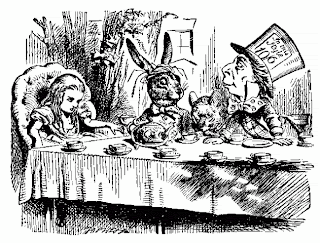Frum became identified with the neoconservative movement at its worst. That is, until the GOP think tank, American Enterprise Institute, dismissed him soon after he began questioning aspects of the party line. (I have to say that today neo-conservatism seems like a fading echo within the spectrum of loud noise on the right.) But partly because I have long seen him as herald of a conservative mindset which in all honesty I despise, I also happen to find much of his current analysis of the ideological cul-de-sac of the Republican party's recent parade of political "stars" fascinating and telling.
 |
| "You'd have to be half mad to dream me up!" |
Especially after 2000, incomes did not much improve for middle-class Americans. The promise of macroeconomic stability proved a mirage: America and the world were hit in 2008 by the sharpest and widest financial crisis since the 1930s. Conservatives do not like to hear it, but the crisis originated in the malfunctioning of an under-regulated financial sector, not in government overspending or government over-generosity to less affluent homebuyers.
